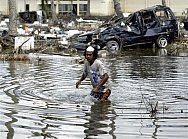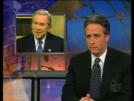Bush’s war in Iraq and the Asian tsunami .. stayin’ alive in 2005
Jan 9th, 2005 | By L. Frank Bunting | Category: USA Today There were two lead news items on the Philadelphia Inquirer website for Friday, January, 7, 2005 – an account of the latest insurgency action in Iraq, and an update on the South and Southeast Asian tsunami disasters of December 26, 2004. It may have been just a slow-news Friday, at the start of a new year that is having a little trouble getting started. But somehow Iraq and the tsunamis also seemed to be saying something about the latest strange challenges immediately ahead, for the pre-eminent free and democratic society in the USA.
There were two lead news items on the Philadelphia Inquirer website for Friday, January, 7, 2005 – an account of the latest insurgency action in Iraq, and an update on the South and Southeast Asian tsunami disasters of December 26, 2004. It may have been just a slow-news Friday, at the start of a new year that is having a little trouble getting started. But somehow Iraq and the tsunamis also seemed to be saying something about the latest strange challenges immediately ahead, for the pre-eminent free and democratic society in the USA.
To take the more recent case of the tsunamis first, they were altogether natural disasters, for which no exactly specifiable group of human beings can reasonably be blamed. (Even allowing for the argument that unwise human public policy in many countries is destabilizing the climate and increasing the numbers of natural disasters – as often urged by environmentalists nowadays and, sometimes, by at least certain branches of the insurance industry too.)
 The late 2004 South and Southeast Asian tsunamis are nonetheless now reckoned to have killed more than 140,000 people, and perhaps still more. According to both Kofi Anan and Colin Powell, who have flown over several affected areas, the tsunamis have wreaked destruction on an altogether massive scale. The resulting human suffering has apparently struck some deep chords in Europe and North America, far away from the actual damage geographically.
The late 2004 South and Southeast Asian tsunamis are nonetheless now reckoned to have killed more than 140,000 people, and perhaps still more. According to both Kofi Anan and Colin Powell, who have flown over several affected areas, the tsunamis have wreaked destruction on an altogether massive scale. The resulting human suffering has apparently struck some deep chords in Europe and North America, far away from the actual damage geographically.
The TV coverage in the US (as in Canada) at first appeared disproportionate to both the events themselves, and the popular interest among the increasingly diverse mass audience. And there may still be something to this. Assorted government-organized tsunami memorials in Canada on January 8, e.g., did not attract at all as many warm bodies as expected. The most statistically popular events on US television in early 2005 are the final moments of the NFL season.
 Yet it has also become increasingly clear that the tsunamis really were big news in the rising global village. They present continuing troubles for a number of big and small countries, especially Indonesia, Sri Lanka, India, and Thailand. Increasingly impressive numbers of people and organizations in the United States (as in Canada again) have apparently welcomed the opportunity to at last do something simple and manageable about the all the world’s current problems, by just sending money to help with the tsunami disaster recovery now in motion.
Yet it has also become increasingly clear that the tsunamis really were big news in the rising global village. They present continuing troubles for a number of big and small countries, especially Indonesia, Sri Lanka, India, and Thailand. Increasingly impressive numbers of people and organizations in the United States (as in Canada again) have apparently welcomed the opportunity to at last do something simple and manageable about the all the world’s current problems, by just sending money to help with the tsunami disaster recovery now in motion.
What might almost be viewed as a kind of parallel man-made or unnatural disaster in Iraq at first seems a quite different case in point. The current highest professional wisdom in disaster management is that, in the increasingly technological and complex global village, so-called natural and man-made disasters are all of a piece. But ever since September 11, 2001 US (and UK and other) policy has been that the struggle against international terrorism – of which Iraq is still seen as a vital part – is finally a war that needs warriors in some kind of old sense, and not some vague post-modern exercise in mere disaster mitigation.
 It just may be, however, that part of the North American media fascination with the Asian tsunami disasters has something to do with the light they inadvertently also seem to cast on what still does appear to be the continuing deep swamp of the War in Iraq (or Mess-O-Potamia, as the Daily Show says).
It just may be, however, that part of the North American media fascination with the Asian tsunami disasters has something to do with the light they inadvertently also seem to cast on what still does appear to be the continuing deep swamp of the War in Iraq (or Mess-O-Potamia, as the Daily Show says).
Conceivably, a more successful-than-expected Iraq election at the end of January 2005 will start to show some clear light at the end of the tunnel for the longstanding Iraq war policy of George W. Bush and Tony Blair (and the Howard government in Australia, which is quite involved with the US as well, in the current distribution of Asian tsunami disaster relief). As I write here, over the weekend of January 8 and 9, an imminent election in Palestine may finally prove another hopeful sign of fresh progress on the longstanding wider regional tensions of the Middle East.
 But for the moment it is still hard to watch the news on US television and feel that the Iraq War is a skilled exercise in a rational and effective foreign policy, shrewdly designed by people with a deft grasp of how the global village is really working – or can be made to work, with the right amount of sheer political will and raw military power. And, as you might hear quietly noted by the women in front of your TV set, far more people have died in the late 2004 Asian tsunami disasters than in the 9/11 terrorist disaster in New York City and Washington, DC.
But for the moment it is still hard to watch the news on US television and feel that the Iraq War is a skilled exercise in a rational and effective foreign policy, shrewdly designed by people with a deft grasp of how the global village is really working – or can be made to work, with the right amount of sheer political will and raw military power. And, as you might hear quietly noted by the women in front of your TV set, far more people have died in the late 2004 Asian tsunami disasters than in the 9/11 terrorist disaster in New York City and Washington, DC.
In fact, the US Federal Emergency Management Agency (FEMA) distributed disaster assistance funds in the 9/11 recovery, as it had as well in the earlier World Trade Center terrorist bombing of 1993. George W. Bush certainly did win 51% of the vote in the 2004 US election, and the Republicans now have simple majorities in both houses of the Congress. But even to some conservative minds the early 2005 juxtaposition of the Asian tsunamis and the latest grim news from Iraq can suggest that effectively fighting international terrorism and the likes of Osama bin Laden finally may be rather more like disaster mitigation than any kind of traditional warfare.
 Alas, this same suggestion can easily enough start to flow in more murky directions. One thing that very big and horrific natural disasters like the Asian tsunamis can do is profoundly humble our sense of human capacity. We can mitigate against natural disasters by being better prepared for them when they do happen. Better tsunami warning systems in South and Southeast Asia could have reduced the loss of human life. Stronger building technologies could have saved more man-made infrastructure. And so forth. But no mere human beings, no matter how many elections they win, can finally prevent such things as earthquakes and tsunamis. In the end they are, as the insurance policies still sometimes say, just “acts of God.”
Alas, this same suggestion can easily enough start to flow in more murky directions. One thing that very big and horrific natural disasters like the Asian tsunamis can do is profoundly humble our sense of human capacity. We can mitigate against natural disasters by being better prepared for them when they do happen. Better tsunami warning systems in South and Southeast Asia could have reduced the loss of human life. Stronger building technologies could have saved more man-made infrastructure. And so forth. But no mere human beings, no matter how many elections they win, can finally prevent such things as earthquakes and tsunamis. In the end they are, as the insurance policies still sometimes say, just “acts of God.”
So the Toronto Globe and Mail columnist Michael Valpy had an intriguing January 8, 2005 piece on “Tsunamis as sign of God’s ire.” A tsunami that killed an estimated 60,000 people struck Lisbon, Portugal in 1775. “Priests immediately set out through the ruined city to hang heretics thought to have been responsible for the devastation by angering God.” The latest Asian tsunamis some 230 years later have prompted not altogether dissimilar reactions. Israel’s Sephardic chief rabbi has called them “an expression of God’s great ire with the world – the world is being punished for wrongdoing.” The secretary-general of the Muslim Council of Britain has said they are the “will of God Almighty.” And according to the Anglican dean of Sydney, Australia, they are just part of God’s “warning that judgment is coming.”
 In the United States and elsewhere there are those who see the War in Iraq – and the no doubt somewhat related Israeli-Palestinian conflict – in a not altogether dissimilar way again. Browsing through the latest reports on the Philadelphia Inquirer website, you bump into ads for a booklet on “The Middle East in Bible Prophecy,” and other material on just how Iraq fits into the same big picture. (And this kind of thing can indeed make you wonder just what George W. Bush was getting at, when he told a group of his most ardent religious supporters that he believed God wanted him to be president.)
In the United States and elsewhere there are those who see the War in Iraq – and the no doubt somewhat related Israeli-Palestinian conflict – in a not altogether dissimilar way again. Browsing through the latest reports on the Philadelphia Inquirer website, you bump into ads for a booklet on “The Middle East in Bible Prophecy,” and other material on just how Iraq fits into the same big picture. (And this kind of thing can indeed make you wonder just what George W. Bush was getting at, when he told a group of his most ardent religious supporters that he believed God wanted him to be president.)
As Michael Valpy equally explains in the Globe and Mail, however, the great human tragedy of the 1775 tsunami disaster in Portugal also helped convince the French philosopher Voltaire that a truly benevolent God who really cares about the fate of human beings could not exist – and propelled him “into the full embrace of the secular Enlightenment” of the 18th century.
 From some similar updated 21st century Enlightenment perspective, it may be more rational (and even in a sense that someone like Donald Rumsfeld might assent to?) to finally see the struggle against international terrorism as much more of an exercise in disaster mitigation, and much less of even some brand new kind of more traditional warfare. And this could be true too for people who continue to value religious perspectives highly, but have a conception of God that is deep enough to withstand all manner of shocks from natural and man-made disasters alike.
From some similar updated 21st century Enlightenment perspective, it may be more rational (and even in a sense that someone like Donald Rumsfeld might assent to?) to finally see the struggle against international terrorism as much more of an exercise in disaster mitigation, and much less of even some brand new kind of more traditional warfare. And this could be true too for people who continue to value religious perspectives highly, but have a conception of God that is deep enough to withstand all manner of shocks from natural and man-made disasters alike.
Exactly what this could or should mean for current US policy in Iraq is still not easy to say, no doubt. But it does seem to point broadly to what you can hear even from some military analysts on US TV lately. Whatever else may or may not be true, the limits of what can be accomplished by both conventional and unconventional military means in Iraq at least ought to be very close at hand – perhaps even closer than was widely thought just a few months ago. Militarily, US policy has been, as the generals say, very successful in Iraq. The fundamental problem is that what the policy finally wants to achieve cannot be achieved by military means.
 As important as it no doubt continues to be, the war against terrorism is indeed not a conventional war. It is something quite different – so different that it is not really a war at all. It is at least something considerably more like disaster mitigation (in which military professionals of various sorts have nonetheless long been involved). As the increasingly media-visible Joseph Nye puts it, the key issue now is “soft power.”
As important as it no doubt continues to be, the war against terrorism is indeed not a conventional war. It is something quite different – so different that it is not really a war at all. It is at least something considerably more like disaster mitigation (in which military professionals of various sorts have nonetheless long been involved). As the increasingly media-visible Joseph Nye puts it, the key issue now is “soft power.”
John Kerry seemed to be alluding to this kind of wisdom once or twice during the 2004 election campaign that he finally lost, in certain parts of the country, and not by all that much. But he never quite managed to pull the thinking together in a practical way, that was convincing to enough people, in the midst of an all-too-real War in Iraq, in which large enough numbers of people continue to lose their lives, on all the various allied sides.
 There is little sign that the Democrats have made any further progress on the issue since then. And there are still many signs that President Bush is still not prepared to reassess his fundamental hard-power wartime strategy at all. Even kinder and gentler conservative pundits like David Brooks remain convinced that there are more optimistic as well as increasingly troubling currents to what is now going on in Iraq and the Middle East. Wait and see what happens in the Iraq election, they say. In most parts of the country it could be considerably more successful than most people in the American media seem to believe right now. And so forth.
There is little sign that the Democrats have made any further progress on the issue since then. And there are still many signs that President Bush is still not prepared to reassess his fundamental hard-power wartime strategy at all. Even kinder and gentler conservative pundits like David Brooks remain convinced that there are more optimistic as well as increasingly troubling currents to what is now going on in Iraq and the Middle East. Wait and see what happens in the Iraq election, they say. In most parts of the country it could be considerably more successful than most people in the American media seem to believe right now. And so forth.
 Yet the South and Southeastern Asian tsunamis may finally be some kind of sign from somewhere that arguments of this sort will not stand up forever. Right now, watching US TV from just across the still “unfortified” northern border, it is sometimes hard to remember that George W. Bush actually won the 2004 election. Asking both his father and Bill Clinton to preside over private fund-rasing efforts for Asian tsunami disaster relief may be a sign of some hidden reserves of common sense. Who knows just what the re-elected president might do, if and when it finally becomes altogether clear to almost everyone that what’s going on in Iraq is really not working, at all as well as it needs to be?
Yet the South and Southeastern Asian tsunamis may finally be some kind of sign from somewhere that arguments of this sort will not stand up forever. Right now, watching US TV from just across the still “unfortified” northern border, it is sometimes hard to remember that George W. Bush actually won the 2004 election. Asking both his father and Bill Clinton to preside over private fund-rasing efforts for Asian tsunami disaster relief may be a sign of some hidden reserves of common sense. Who knows just what the re-elected president might do, if and when it finally becomes altogether clear to almost everyone that what’s going on in Iraq is really not working, at all as well as it needs to be?
